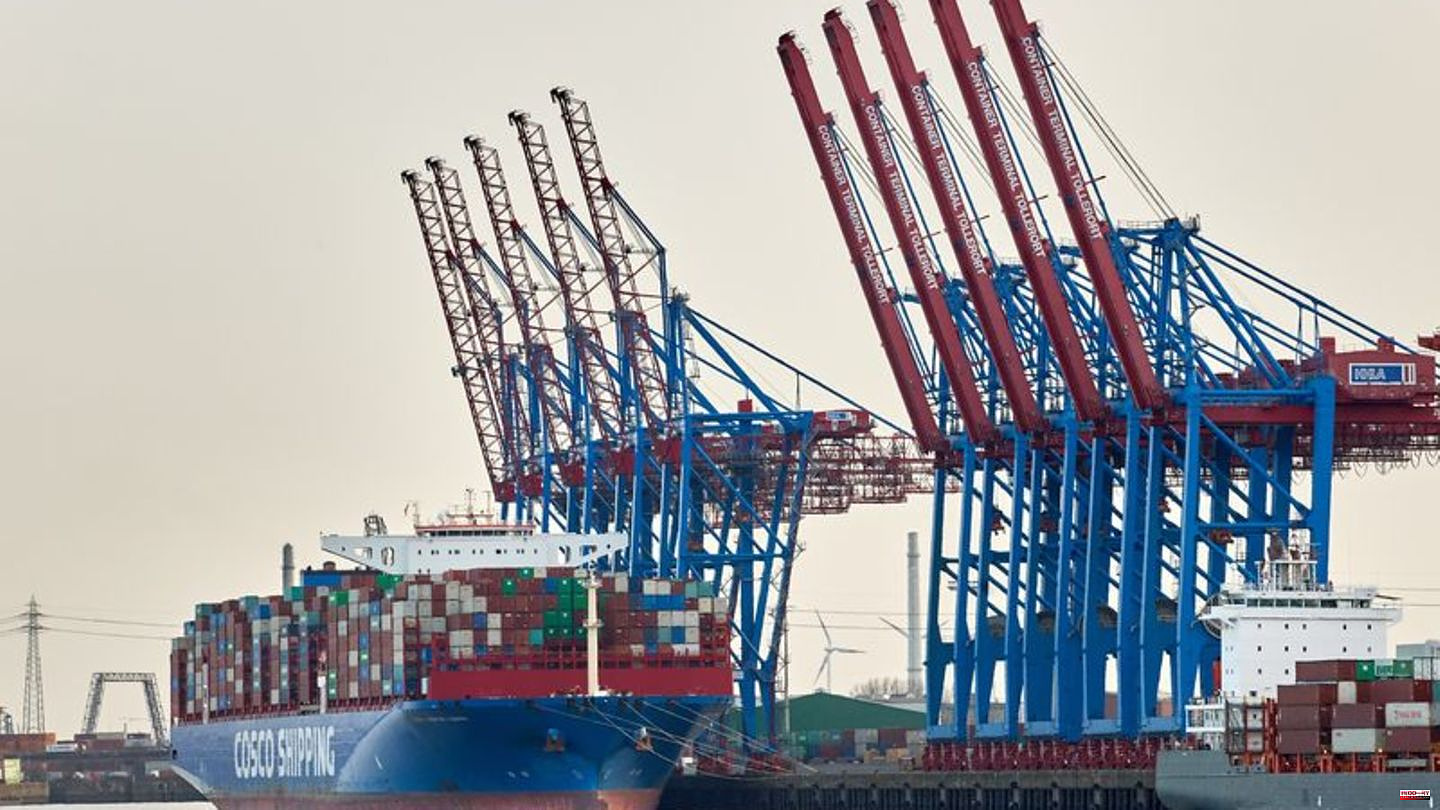In the case of the politically controversial Chinese participation in a container terminal in the port of Hamburg, a compromise solution is being reached within the federal government. According to this, the Chinese Cosco group would participate in the Tollerort terminal of the Hamburg port logistics company HHLA, as agreed more than a year ago. However, the share of the Chinese would only be 24.9 percent.
The federal cabinet is to decide on the compromise on Wednesday, according to government circles. The departmental coordination required for this was still ongoing on Tuesday.
Specifically, it is a so-called partial ban. This prevents a strategic participation and reduces the participation to a purely financial participation, it said. There was talk of an "emergency solution" that would limit the damage. The acquisition of 35 percent of the voting rights at the Tollerort terminal by a subsidiary of the Chinese group Cosco should be partially prohibited if the voting rights reach or exceed 25 percent. This means that there may only be a participation of less than 25 percent.
Scholz before China trip
Under the impression of recent experiences with Russia and the dependence on its gas supplies, a political dispute broke out over the question of whether Chinese participation should be allowed. Federal Economics Minister Robert Habeck (Greens) warned of new dependencies and wanted to completely ban Chinese entry. Other ministries wanted this too.
However, according to media reports, the Chancellery was pushing for the entry to take place. If the cabinet does not decide this week, the sale is automatically approved as agreed by Cosco and HHLA, it said.
On the fringes of an EU ministerial meeting in Luxembourg, Habeck reiterated his position that "if possible, we should have no Chinese investments in critical infrastructure." He added that the vote in the federal government was not yet complete.
Chancellor Olaf Scholz (SPD), who is traveling to China at the beginning of November, recently emphasized that nothing had been decided and that many questions still had to be clarified. He also pointed out that it was not about selling the port. The land itself is 100 percent owned by the Hanseatic City of Hamburg.
Under company law, a stake of 24.9 percent is below the so-called blocking minority of one quarter, with which important decisions of a company can be blocked by a shareholder.
Competition is based in Antwerp and Rotterdam
It is unclear how the Chinese group will react to the new situation. A corresponding dpa request to Cosco Shipping Ports Limited (CSPL) remained unanswered on Tuesday. According to dpa information, the solution found in Berlin should be coordinated with the Chinese side. At the Hamburg port logistics company HHLA, it is assumed that the Chinese will support the compromise solution with a participation reduced to 24.9 percent, according to company circles. During the talks with the federal government there has always been feedback with Cosco in the past few days.
The Cosco Group also operates the world's fourth largest container shipping company. Their ships have been calling at the Tollerort terminal for more than 40 years. In return for the stake, Cosco wants to make the CTT a preferred transhipment point in Europe. Shipping company shares in terminals are common in global container logistics. For example, Hapag-Lloyd has a stake in the HHLA terminal in Altenwerder in Hamburg and Maersk holds shares in a terminal in Bremerhaven. Cosco itself already holds shares in eight terminals in Europe alone.
Shipping companies secure handling capacities with such participations. In return, terminal operators ensure the utilization of their facilities. In addition, external equity investments help to make the necessary investments that are necessary, for example, for the automation and climate-neutral conversion of the handling. According to estimates from industry circles, a failure of the Cosco entry would be fatal for the largest German seaport. "They have to do it," they say. In Hamburg there is concern that if the business fails, Cosco could relocate to the larger competing ports of Rotterdam or Antwerp, for example. The world's largest exporter, China, is by far the most important trading partner of Germany's largest seaport, accounting for around a third of the containers handled.
Influence of Cosco on German China policy?
The compromise that is now emerging is controversial in the traffic light coalition. The Greens chairman Omid Nouripour told the dpa: "The partial ban on Cosco's takeover intentions would at least take the edge off the sale of our critical infrastructure to a Chinese state-owned company." But that doesn't change the fact that Scholz's decision not to completely ban the sale was wrong. The FDP politician Marie-Agnes Strack-Zimmermann told the dpa that the compromise with less Chinese participation was another serious mistake in times of great uncertainty.
The China Institute Merics warned of risks. Analyst Jacob Gunter told the German Press Agency in Berlin: "Cosco and its investment in the port of Hamburg pose various risks to Germany's security and economic interests." Cosco is not just another multinational company simply looking for a return - it is a tool used by the Chinese government to advance its strategic goals. The more dependent Germany becomes on investments and deals with Cosco, the more influence Cosco and party officials can have on German China policy.







